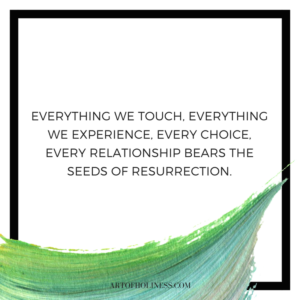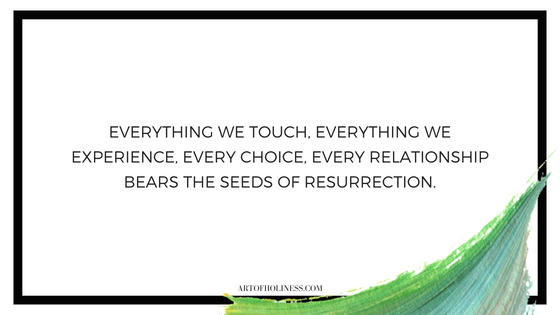 No one told us we’d need a solid theology of the body if we’re going to live a bold and fearless life.
No one told us we’d need a solid theology of the body if we’re going to live a bold and fearless life.
No one told us how important it would be to understand how the physical attaches to the spiritual. Mostly we have been taught how the physical works against us. When we were kids, we were given all the guilt-producing reasons why our bodies could hurt our relationship with Jesus. It was that Sunday school teacher or that parent or that youth pastor who told us how our bodies work in ways that create shame. Some of us were raised by functional Gnostics and their message screwed us up.
No one told us that God loves our bodies and that bodies matter in the Kingdom of God; that understanding them might actually change the way we approach every single other area of our lives.
That is why Paul the Apostle stuns me … yet again. In the course of coming to know and trust Jesus and in the course of an incredibly oppressive ministry, Paul absorbed the remarkable gift and grace of God’s design for the human body. Seeing the world from the Kingdom down, Paul wrote a theology that helps us understand what God intends for our bodies now and for eternity.
“Do you not know that your bodies are temples of the Holy Spirit, who is in you, whom you have received from God?” Paul asks. “You are not your own; you were bought at a price. Therefore honor God with your bodies” (1 Corinthians 6:19-20). And this, from a man whose own body suffered every violence. In the middle of being beaten and stoned and shipwrecked and left for dead, Paul figured out that God was actually using his body to prove the Gospel. In his second letter to the Corinthian church, Paul describes all he has been through. He has been hungry, thirsty, in every possible kind of danger. He has been flogged and exposed to death, not to mention chronically stressed by the intensity of his work.
He shares all this anguishing pain, then somehow moves seamlessly into the story of an intense, personal experience with Heaven. Paul writes (in third-person language, so humbled is he by the revelation) that he has been transported to the “third heaven.” Overcome, he can’t be sure where his body was in the process, but you get the sense that he suspects he was all there, body and soul. And now, compared to this experience everything else pales. The sufferings are redefined, the “surpassing great revelations” are worth it all.
And then, as if drawing a giant bell curve from the physical to the spiritual and back to the physical, Paul transitions his narrative back to earth, announcing that God has given him a “thorn in the flesh.” This weakness (whatever it is) serves as a kind of anchor, keeping him rooted in his physical reality after such a stunning encounter with the unhindered Kingdom of God.
Paul’s story flows from suffering to glory to weakness, mapping out a spirituality that affirms the physical, weaving it together with the spiritual to make a created whole. Because he has seen the eternal while still existing in the physical, Paul can say with confidence that the potential for resurrection is built into the very fabric of creation. Because Jesus has erased the dividing line and conquered death, the seeds of resurrection are embedded into everything. Everything we touch, everything we experience, every choice, every relationship bears the seeds of resurrection. And this life we live now is not counter to the life we will have in eternity; it is just the beginning. Redemptive continuity draws an unbroken line from prevenient grace, through justification and sanctification to glorification. We don’t “jump tracks” to enter eternity. All we have now draws us toward what we will have then.
Josh McDowell says that how we understand the resurrection of the body impacts all our decisions, and indeed the trajectory of our lives. It impacts our choices. We discover that our bodies matter. What we do with them matters, whether we are talking about health or sexuality or suffering. Our bodies bear the seeds of resurrection and are daily being redeemed by the resurrected Christ. To the extent that we ignore those seeds, they will lay dormant and bear no fruit. To the extent that we feed and water them, they will grow and bear the fruit of a resurrected life.








